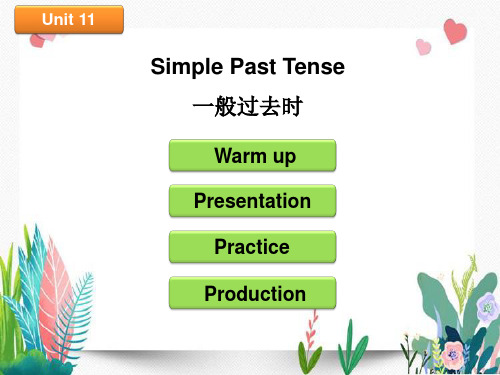一般过去时学习课件
一般过去时学习ppt课件

Lucy __d_id_n_’_t_ ___d_o___ her homework at home. 2、He found some meat in the fridge.(变一般疑问句)
__D_i_d__ he __f_in_d_ ___a_n_y_ meat in the fridge? 3、She stayed there for a week.(对划线部分提问)
2、His father worked all day last Monday.(改一般疑问句) __D_i_d__his father ___w_o_r_k__ all day last Monday?
3、 I was very busy last week. (改否定句和一般疑问句) I __w__as_n_’_t_ very busy last week. _W__er_e_ you very busy last week?
2. 结尾是 e 的动词加 -d
3. 末尾只有一个辅音字母的重读 闭音节词,先双写这个辅音字 母,再加-ed
look play start live hope use
stop plan trip
looked played started lived hoped used
stopped planned tripped
/t/ /d/ 之后念 /id/ , 即 ed 在 /t/ /d/ 音后面念 /id/
例:wanted shouted needed counted
“雪亮工程"是以区(县)、乡(镇) 、村( 社区) 三级综 治中心 为指挥 平台、 以综治 信息化 为支撑 、以网 格化管 理为基 础、以 公共安 全视频 监控联 网应用 为重点 的“群 众性治 安防控 工程” 。
一般过去时(12张PPT)初中英语专项复习课件

一般过去时 初中英语专项分析
一般现在时 de 应用场景
过
动作行为
去
发
生
曾经
的
存在的状态
识别 标志词 理解 句意
答题技巧
熟练 动词 转换
yesterday last week 3 days ago
动词 过去式
熟练 句型 转换
肯定 否定 疑问
一般 过去时 He played basketball yesterday.
yesterday? Yes, I did. No, I didn’t.
动词 过去式 形态的变化
一般
直接加 ed
二般
以 e 结尾,去 e 加 ed live dance hope use
动词 过去式 形态的变化
三般
重读辅元辅,双写尾字母
stop plan
四般
辅音字母 + y 结尾,把 y 变 i 加 ed cry study worry
标志词
时间状语:last night, yesterday, the day before yesterday last week, some years ago in 1995, the other day, just now, in the past
小学英语时态之 一般过去时讲解课件ppt

一般过去时:
定义: 一般过去时,是表示过去某一时刻或某一段时间内发生的动作或存在
的状态。
标志词: yesterday, just now, …ago, last…, this morning …
结构: 谓语是be动词
谓语是行为动词
肯定句: 主语+ was/were + 其他 否定句: 主语+ was/were + not + 其他 一般疑问句: Was/Were + 主语+其他? 肯定句: 主语+ 动词的过去式 + 其他 否定句: 主语+ didn’t +动词原形 + 其他 一般疑问句:Did + 主语+ 动词原形 +其他?
at the weekends this morning often
usually
last Mid-Autumn Festival
every day three days ago on Mondays
tomorrow a moment ago 14 years ago
找出表示一般过去时的时间副词。
( B) 1. My mother had breakfast and____to work.
A. go B. went C. going D. to go
( A)2. -- How __ your vacation?
-- It was pretty good. A. was B. were C. did D. do
( )3.Each student one picture.
A.draw B. draws C. drawing D.to drawing
一般过去时课件(PPT)

B pictures in the park 1.I ___
Exercises
last weekend. A.take B.took C.was D.draw
A 2. Did you ___football yesterday. A. play B. played C. were D. are
A 3.He always _____me last term. A. helped B. helps C. helping D. help 4.Where did you ___last B Monday? A.went B.go C.do D.did
climbed a mountain
mped
fly kites read a book sing and dance eat good food
swim do am/is are study
flew kites read a book sang and danced ate good food
6. He usually gets ____ (get) up at 6 getting in the morning. Look! He is ______ (get) up now. But yesterday he got (get) up very late, so he ____ went (go) to school late. He was ____ ___ (be) late for school.
动词原形、第三人称单数 动词过去式
They don’t watch TV in the evening. didn’t watch TV last night. They _________
She doesn’t play basketball after school. She _________ didn’t play basketball after school yesterday. Do you go to school on foot every day? go to school on foot yesterday. ___ Did you __ Does he go to school by bus every day?
一般过去时(课件)

一般过去时(课件)一般过去时是英语中表达过去某个时间点或时间段发生的动作或状态的一种时态。
在一般过去时中,动词的形式需要根据主语的人称和数进行变化。
一般过去时的句型结构是:主语 + 动词过去式 + 其他。
一、一般过去时的构成1. 规则动词:在动词原形的基础上加上ed。
例如:work → worked, play → played, study → studied。
二、一般过去时的用法1. 表示过去某个时间点发生的动作。
例如:I went to the library yesterday.2. 表示过去某个时间段内发生的动作。
例如:We playedfootball last weekend.3. 表示过去某个时间段内的状态。
例如:She lived in New York for five years.4. 表示过去习惯性动作。
例如:He used to smoke when he was young.三、一般过去时的疑问句和否定句1. 疑问句:将助动词did放在主语之前,动词原形放在助动词之后。
例如:Did you watch the movie last night?2. 否定句:在主语和动词之间加上助动词did,动词原形变成动词的过去式,并在动词过去式前加上not。
例如:I didn't finish my homework yesterday.四、一般过去时的特殊用法1. 过去进行时:表示过去某个时间点正在进行的动作。
例如:What were you doing at 8 o'clock last night?2. 过去完成时:表示在过去某个时间点之前已经完成的动作。
例如:I had finished my work before he came.3. 过去完成进行时:表示在过去某个时间点之前一直在进行的动作。
例如:She had been waiting for two hours when he finally arrived.一般过去时(课件)一般过去时是英语中表达过去某个时间点或时间段发生的动作或状态的一种时态。
一般过去时时态ppt课件

精选课件
3
第二个-----“四种时间状语”
• ① yesterday及相关短语。
• 例如:
• yesterday morning/afternoon/evening • 昨天上午/下午/晚上。 • ② “last+ 时间状语”构成的短语。 • 例如:
• last night/month/spring/year
“四种句式的构成”—有be动词
• ①肯定句:主语+was/were +其它 . • 例如:We were late yesterday. • 昨天我们迟到了。 • ②否定句:主语+was /were+not +其它. • We weren't late yesterday. (我们昨天没迟到
精选课件
精选课件
5
第三个—“四种谓语动词的表现形式”
• ① be动词的过去式was、were.
• 例如:She was a teacher five years ago.
• 她五年前是一名教师。
• ② 连系动词(连接主语和表语)的过去式。
• 例如:become-became She became angry.
• 1. They produce silk in Suzhou.(改为一般疑问 句)
• ___________________________________? • 2. They built a bridge between the two islands. (
改为否定句)
• ___________________________________?
• 詹妮昨天买了一件短裙。
• ② 一般过去时态的否定句式 “主语 +didn’t+动词原形+其它”
讲解(一般过去时)ppt课件

句型变化 1.系动词be
陈述句(肯定): She was a doctor two years ago. 陈述句(否定): She was not a doctor two years ago. 一般疑问句: Was she a doctor two years ago?
肯定回答:Yes, she was. 否定回答:No, she wasn’t. 特殊疑问句: When was she a doctor?
5
动词一般过去时,表示过去发生的事; be用was或用were, have,has变had; 谓语动词过去式,过去时间坐标志; 一般动词加-ed,若是特殊得硬记。 否定句很简单,主语之后didn’t添; 疑问句也不难,did放在主语前; 如果谓语之前有did,谓语动词需还原; 动词若是was,were,否定就把not添。
• 为什么她去年离开了学校? Why did she leave the 时
• 1.定义: 1)表示过去某个时间发生的动作或存在的状态,常和 表示过去的时间状语连用;2)也表示过去经常或反复发生的动 作,常和表示频度的时间状语连用。
• 标志性状语
2.时间状语:yesterday last night
6
7
8
• 1. look • 4. carry • 7. call • 10.like • 13.dance • 16.stay
2. live 5. hope 8. finish 11.play 14.cry 17.cook
3. stop 6. trip 9. want 12.watch 15.plan 18.invent
3. _____________________ on Sundays. They went to the park last Monday.
小学一般过去时ppt课件

常与表示过去的时间状语连用
如yesterday, last week等。
2024/1/26
8
肯定句使用场景举例
1 2
描述过去发生的事情
如"I went to the park yesterday."(我昨天去 了公园)。
表达过去的习惯或经常性动作
如"She always walked to school when she was young."(她年轻时总是步行去学校)。
5
时间状语及标志词
2024/1/26
时间状语
yesterday,last week,an hour ago等。
标志词
ago(以前),just now(刚才 ),then(那时)等。
6
PART 02
肯定句结构与用法
REPORTING
2024/1/26
7
肯定句结构特点
主语 + 动词过去式
表示过去某个时间发生的动作或状态。
式。
注意动词变化
掌握规则动词和不规则动词的 过去式变化,避免使用时出现
错误。
结合语境理解
在阅读和听力练习中,结合上 下文语境理解一般过去时的用
法。
模仿和练习
通过模仿和练习,逐渐熟练掌 握一般过去时的运用技巧。
2024/1/26
26
THANKS
感谢观看
REPORTING
2024/1/26
27
疑问句句尾语调上升。
2024/1/26
16
疑问句使用场景举例
对过去发生的事情进行提问。
2024/1/26
对过去某个时间点的状态进行 提问。
对过去某个时间段内发生的动 作进行提问。
小学英语小学英语语法课件-一般过去时 (共37张PPT) 全国通用

Presentation Sentences
一般过去时的主要用法和概念:一般过去时表示在过去某时 发生的动作或存在的状态,常与表示过去的时间状语 yesterday, last week, ago等连用。
一般过去时的用法: ① 表示过去时间里发生的动作或存在的状态,常与表示过去 的时间状语yesterday, last year, ago, the day before, yesterday, just now等连用。 ② 表示在过去一段时间里,经常性或习惯性的动作或状态, 常与always, often, usually等连用。
一般疑问句:a_t_t_h_e_l_iv_e__s_h_o_w_?_______________________ How many people were there at the
对划线部分提问:_l_iv_e__s_h_o_w_?________________________
Practice Oral Practice
Unit 11
Simple Past Tense 一般过去时
Warm up Presentation
Practice Production
Warm up
Free talking: What do you usually do on weekdays?
I usually get up at 6:00, I put on my clothes, make the bed, brush my teeth, wash my face. I have breakfast at 6:40, then wipe the table. I go to school at 8:00, and eat lunch at 12:00. Then I usually do my housework at 6:00, take a bath at 7:00, and watch TV at 7:45, and go to bed at 9:00.
小学英语一般过去时86314精品PPT课件 图文

肯定/否定回答: Yes, they did. No , they didn’t.
2. Ann did her homework yesterday evening.
一般疑问句: Did Ann do her homework yesterday evening?
肯定句: He was ill yesterday. 否定句:He was not ill yesterday.
肯定句:The cat ate a bird last night. 否定句:The cat didn’t eat a bird last night.
一般过去时的 一般疑问句
1.把was, were放在句首,其余位置不变。
肯定句: We were busy last week.
否定句: →We were not busy last week.
2.(行为动词类)要在行为动词的前面加助动词didn’t. 然后把 动词过去式改为动词原形。 即:didn’t + 动词原形
肯定句: She played the violin last night.
was were did
went had made got
eat
ate
say said
see saw
一般过去时 肯定句变否定句
Be动词类 • 否定句
在的状态 的句子中在was, were的后面加上not。
如: 肯定句:
He was in the park the day before yesterday. 否定句: →He was not in the park the day before yesterday.
人教版七年级下语法教学:一般过去时(Present SimpleTense)课件(共23张ppt)

I love her so much.
Past tense 过去式
regular change 规则变化
原形 过去式wasຫໍສະໝຸດ -__w__a_s_h__e_d__
love-__lo__v_e_d_ stop-__s_t_o_p__p_e_d_worry-__w__o_r_r_ie_ d
She taught me many things when I was little. She helped me with schoolwork when I began my schoolwork. She looked after me so well that I could grow up well. She did quite a lot of these things Just because she loved me.
He/She was really .... He/She taught me .... He/she also helped me.... For me, he/she made me.... .... I am really thankful to him/her.
grandpa, grandma, dad, mom, teacher, friend, volunteer…
On Mother’s last month, students did quite a lot of things for their mothers. Some students in our class ___d_id__a lot of things for mothers. Gina __b_o_u_g_h_t_(buy) a bunch(束) of carnations. Tom ____m__a_d_e___(make) a card by himself. Cathy thinks her mother works too hard, so she _c_le_a_n_e_d_(clean) the living room and __w__a_s_h_ed (wash) the dishes. But only Jimmy ____d__id_n_’_t _d_o__ (not do) anything. He __d_i_d_n_’t_d__ec_i_d_e__(not decide) what to do. All of us hope that our mothers will like these gifts.
一般过去时讲解PPT课件

did
助动词,用于构成一般过去时的 疑问句和否定句。
主语
句子中的动作执行者,可以是名 词、代词等。
例如
What did you do yesterday? 你 昨天做了什么?
其他成分
包括宾语、状语等,根据句子需 要而定。
动词原形
指动词的基本形式,即不加任何 时态或语态标记的形式。
特殊疑问句实例分析
when、after、 before、as等引导的 表示过去的时间状语 从句。
已经、曾经、刚才、 那时等表示过去的时 间副词。
02
一般过去时肯定句结构
主语+动词过去式+其他成分
01
02
03
主语
句子中的主体,可以是人 、物或抽象概念。
动词过去式
表示过去某个时间里发生 的动作或状态。动词的过 去式可分为规则变化和不 规则变化两种。
表示过去某个时间里发生的动 作或状态。
用法
陈述过去的事实或情况,描述 过去经常或反复发生的动作。
现在完成时
表示过去发生的动作对现在造 成的影响或结果,或从过去已 经开始,持续到现在的动作或 状态。
用法
强调过去与现在的联系,表达 一个动作从过去一直延续到现
在。
两者在时间状语上的区别
01
02
03
04
一般过去时
一般过去时讲解PPT课件
目录 Contents
• 一般过去时基本概念 • 一般过去时肯定句结构 • 一般过去时否定句结构 • 一般过去时疑问句结构 • 一般过去时特殊疑问句结构 • 一般过去时与现在完成时的比较
01
一般过去时基本概念
定义与作用
定义
一般过去时表示过去某个时间里 发生的动作或状态。
一般过去时(复习)公开课PPT课件

以辅音字母+y结尾的动词,把y变为i 再加-ed,如:study—studied。
以不发音的e结尾的动词,动词词尾 加-d,如:live—lived。
以一个辅音字母结尾的重读闭音节动 词,双写词尾辅音字母,再加-ed, 如:stop—stopped。
创造英语环境
在日常生活中尽量使用英 语,提高英语的实际运用 能力。
鼓励学生在日常生活中运用一般过去时
记录日常活动
用英语记录自己一天的活 动,使用一般过去时描述 过去发生的事情。
讲述经历
和同学或家人分享自己的 经历,使用一般过去时讲 述故事。
看图说话
选择一张图片,使用一般 过去时描述图片中的人物 和事件。
通过给出句子和选项,让学生选择正确的动词过去式完成句子。
改写句子
提供现在时的句子,要求学生将其改写为一般过去时。
连词成句
给出打乱顺序的单词,让学生重新排列并加上适当的标点符号,形 成语法正确、意思完整的句子。
小组讨论并分享经验
分组讨论
学生分组,每组围绕一个与一般过去时相关的话题展开讨论,如“你昨天做了什 么?”或“你曾经去过哪些地方?”。
常见误区及注意事项
不规则动词的过去式需要特殊记忆,不能简单地加-ed,如:go—went, eat—ate等。
在使用一般过去时时,要注意动词的过去式与过去分词的区分,避免混 淆。
在表达过去发生的动作时,要注意时间状语的正确使用,确保时态的一 致性。
03
一般过去时在句子中运用
陈述句中使用一般过去时
讲解一般过去时在各种句式中的 表达方式,如肯定句、否定句、 疑问句等,并给出相应的例句。
一般过去时公开课优秀课件小学一般过去时优秀课件

在写作中的应用
总结词
在写作中,一般过去时常常用来描述故事、事件或个人经历等过去的事情,使叙述更加 生动和有说服力。
详细描述
在写作中,特别是记叙文、小说、回忆录等文体中,一般过去时被广泛使用。通过使用 一般过去时,作者可以生动地描绘过去的事件、人物和场景,让读者更好地感受到故事 的情感和情节。同时,一般过去时也可以用于描述历史事件和事实,使叙述更加客观和
用于描述已经发生的 事情,例如:昨天我 去了公园。
一般过去时的基本形式
01
02
03
04
动词形式变化
规则动词和不规则动词的过去 式形式。
时间状语
通常与表示过去时间的状语连 用,如yesterday, last week
等。
否定形式
在动词前加助动词did not (didn't) 或 didn。
疑问句形式
感谢您的观看
THANKS
填空练习
提供缺少动词的句子,让 学生填写正确的过去时态 动词。
选择题
列出多个动词,让学生从 中选择正确的过去时态形 式。
改错题
提供含有错误过去时态的 句子,让学生进行纠正。
语境练习
情境对话
设置一个特定的情境,让 学生使用过去时态进行对 话。
故事编写
让学生编写一个以过去时 态为主的故事,强调时态 的正确使用。
一般过去时公开课优 秀课件
汇报人:可编辑
2023-12-24
目录
CONTENTS
• 一般过去时的定义 • 一般过去时的用法 • 一般过去时的常见错误 • 一般过去时的练习 • 一般过去时的实际应用
01 一般过去时的定义
什么是一般过去时
一种描述过去事件或 状态的时态。
- 1、下载文档前请自行甄别文档内容的完整性,平台不提供额外的编辑、内容补充、找答案等附加服务。
- 2、"仅部分预览"的文档,不可在线预览部分如存在完整性等问题,可反馈申请退款(可完整预览的文档不适用该条件!)。
- 3、如文档侵犯您的权益,请联系客服反馈,我们会尽快为您处理(人工客服工作时间:9:00-18:30)。
4、There was some orange in the cup.(变一般疑问句) W__a_s__ there __a_n_y_ orange in the cup?
巧记动词过去时态
动词一般过去时,表示过去发生事; be用was或用were, have,has变had; 谓语动词过去式,过去时间坐标志; 一般动词加-ed,若是特殊得硬记。 否定句很简单,主语之后didn't添; 疑问句也不难,did放在主语前; 如果谓语之前有did,谓语动词需还原; 动词若是was,were,否定就把not添。
2.表示过去经常或反复发生的动作。 My father often went to work by bus last year. When I was a child, I often listened to music.
行为动词一般过去时的否定式
一般过去时的否定式是在动词原形 前加助动词did not (didn't).
一般过去时
知识结构
构成 用法 常用时间
动词的过去式
1.表示过去某个时 间发生的动作或 存在的状态。
2.表示过去经常或 反复发生的动作。
yesterday last night in 1990 two days ago
动词过去式 的构成
Байду номын сангаас
规则动词
用法
不规则动词
构成 读音
规则动词过去式的构成
构成规则
一般疑问句:
_D_i_d_ they _fi_n_is_h_ their work at four? Yes, they __d_i_d_. No, they _d_id_n_'_t.
行为动词一般过去时的疑问式
一般过去时的特殊疑问式
疑问词+did+主语+动词原形……?
They finished their work at four.
stopped planned tripped
4. 结尾是“辅音字母+y”的动词, study studied
先变“y”为“i”再加-ed
carry carried
清念 /t/ ,元浊/d/ ;
清念 /t/ ,即 ed 在清辅音后面念 /t/ 例:finished helped
passed cooked
例词
1. 一般在动词原形末尾加-ed
2. 结尾是 e 的动词加 -d
3. 末尾只有一个辅音字母的重读 闭音节词,先双写这个辅音字 母,再加-ed
look play start live hope use
stop plan trip
looked played started lived hoped used
一般疑问句: _____D_i_d_h_e _fi_nd_a__bo_o_k_in__th_e_ro_o_m_?_____
特殊疑问句 (对a book 提问) _____________________________
What did he find in the room?
/t/ /d/ 之后念/id/
? 元浊 /d/ ,即 ed 在元音,浊辅音后面念 /d/
例:borrowed enjoyed
called moved
? /t/ /d/ 之后念 /id/ , 即 ed 在 /t/ /d/ 音后面念 /id/
例:wanted shouted needed counted
evening practiced English
巧手变句型
1、Lucy did her homework at home.(改否定句) Lucy __d_i_d_n_'t_ ___d_o___ her homework at home.
2、His father worked all day last Monday.(改一般疑问句) __D_i_d__his father ___w_o_r_k__ all day last Monday?
Infinitive am is are begin break bring build buy can
不规则动词表
Past tense was were begun broke brought built bought could
Infinitive catch come do draw drink drive eat fall
_W__a_s_ there _a_n_y__ orange in the cup?
Bill's weekend
On Saturday morning, he….
Saturday
morning
went to the library
Sunday morning did homework
afternoon played basketball
改写句子:
PRACTISE
That's great√
1、Lucy did her homework at home. (改否定句)
Lucy __d_id__n_'t_ ___d_o___ her homework at home. 2、He found some meat in the fridge. (变一般疑问句 )
__D_i_d__ he __f_in_d_ ___a_n_y_ meat in the fridge?
3、She stayed there for a week. (对划线部分提问)
_H__o_w__ __lo_n__g_ ___d_id_ she __s_ta_y_ there?
4、There was some orange in the cup. (变一般疑问句 )
I watch TV everyday I watched TV last night She has eggs and bread every morning She had eggs and bread yesterday morning
Jay gives a concert every month Jay gave a concert last month
A
B
对划线部分提问
What did they do at four?
When did they finish their work?
注意
1.外加助动词did后,动词须返回原形。
Did he went to school yesterday? F Did he go to school yesterday? T 2.简略回答用助动词did/didn't代替 行为动词。 Did he find the boy yesterday? -Yes, he did. -No, he did not (didn't).
Past tense caught came did drew drank drove ate fell
用法
1.表示过去某个时间发生的动作或存在的状态。 He was here yesterday. I got up at six thirty yesterday morning. My father was at work yesterday afternoon. Did you have a good time last summer?
主语+didn't+动词原形
I _t_o_ld_ (tell) them the news yesterday.
I _d_id_n_'_t_t_e_ll_ them the news.
行为动词一般过去时的疑问式
一般过去时的一般疑问式在句首加助 动词did Did+主语+动词原形……? They f_in_i_s_h_e_d (finish) their work at four.
That's great√
start a conversation
with改头换面(句式变化)
Rahul ? 按要求改写句子。
He found a book in the room.
否定: ______H_e _d_id_n'_t _fin_d_a_b_o_o_k _in_t_h_e _ro_o_m_. ___
